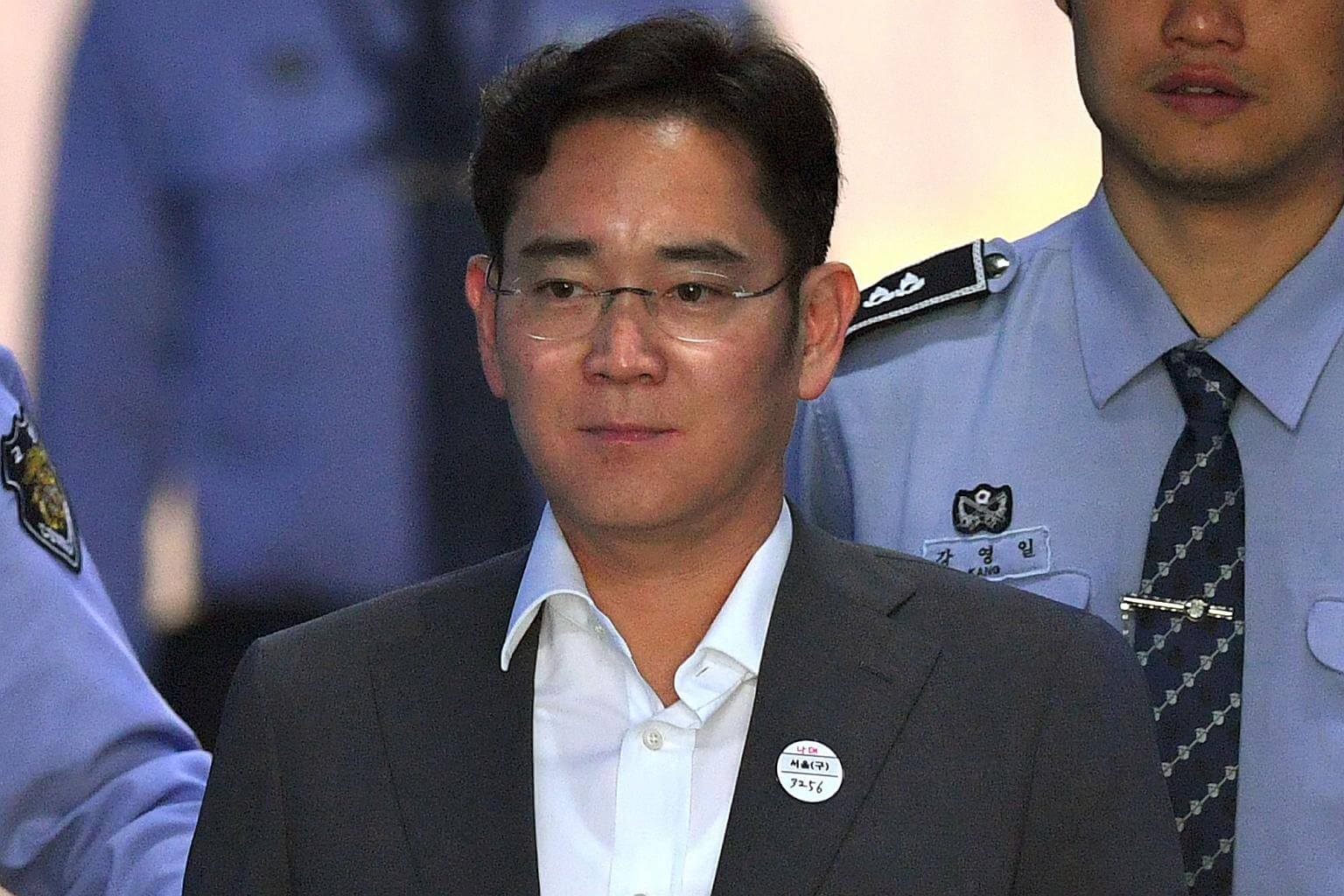Day of reckoning approaches for Samsung successor caught in corruption case
Sign up now: Get insights on Asia's fast-moving developments

Samsung's heir apparent Lee Jae Yong is escorted by prison guards as he arrives at the Seoul Central District Court on May 11, 2017.
PHOTO: AFP
Follow topic:
SEOUL (WASHINGTON POST) - After four months of laying out their case against Samsung's heir apparent, South Korean prosecutors will on Monday (Aug 7) call for Lee Jae Yong to be imprisoned for his role in a corruption scandal that has brought down a South Korean president.
It will take weeks for the courts to decide whether to keep Lee behind bars, but regardless, this has been an embarrassing public episode for South Korea's biggest conglomerate.
Lee has been in detention since early February, spending his nights on a foldable mattress in his cell and his days on a prison bus or in court, leaving the company rudderless as his father, who technically remains Samsung's chairman, has been unconscious in hospital for more than three years.
This came on the heels of the disastrous flaming Galaxy Note 7 episode and amid an acrimonious divorce between Lee's sister and her ex-husband, which has been the subject of gossipy coverage.
Still, despite all the upheaval, Samsung Electronics, the conglomerate's flagship unit, managed to report a net profit of almost US$10 billion in the second quarter.
Lee faces five years in prison if found guilty of bribery and longer if convicted on an embezzlement charge. South Korean media have reported that the special prosecutors will ask the judge for a "heavy" sentence, perhaps more than 10 years, to account for Lee's multiple alleged violations.
Lee was arrested and charged with bribery and embezzlement as part of the sensational corruption scandal that revolved around former president Park Geun Hye, who was impeached in March and is also on trial.
According to the special prosecutors, Choi Soon Sil, a confidante and longtime friend of Park's who held no official position, had been collecting fees from big business on behalf of the then-president. Choi is also on trial.
Lee and other Samsung officials have been charged with giving or planning to give a total of US$38.5 million in bribes to Choi. This included US$7 million for a horse for Choi's daughter, who hoped to compete in equestrian events at the Olympic Games.
Lee was also charged with embezzlement because the funds for the bribes came from the company's balance sheet.
Throughout his trial, he has consistently said that Choi extorted the money from Samsung. Other executives from Samsung, several of whom are also on trial, have taken the stand to support Lee's testimony and have offered to take the responsibility for any of Samsung's wrongdoings.
One of the high-ranking officials, Choi Gee Sung, recently claimed that he was to blame for all the problematic decisions, including the donations to Choi. He said Lee wasn't even briefed about the payments.
During his carefully scripted appearances before a packed courtroom, Lee has sought to distance himself from the decisions, saying he "trusts in the ability of his own people so leaves them to make corporate decisions".
In his usual black suit, the 49-year-old has seemed relaxed during his court appearances. He even made the audience chuckle.
"It was the first time in my life that I had been scolded by a woman," he said, referring to a time that Park admonished him for not adequately supporting the South Korea Equestrian Federation, one of Choi's pet projects.
But Lee has flatly denied talking to Park about ways to ensure that Samsung, a sprawling conglomerate that the Lee family controls through a labyrinthine cross-shareholding structure, stayed in family hands.
This issue is at the crux of Samsung's involvement in the presidential scandal. Prosecutors allege that the conglomerate donated money to Choi in return for the government pension fund, a major shareholder, approving the merger of two Samsung units - which enabled Lee to consolidate his power.
The Seoul Central District Court is expected to deliver its verdict this month.
Corporate bribery of political leaders has been a standard part of modern South Korean political history. Indeed, Lee's father was convicted of bribery charges and later pardoned, while Lee's grandfather, the founder of Samsung, was implicated in similar cases.
Analysts say the power of Samsung - it accounts for about one-fifth of the country's exports - and the lack of concrete evidence mean that Lee could easily walk free.
"The judiciary has given favourable rulings to Samsung in the past," said Kim Young Hwan, a lawyer and former secretary general of the Korean Bar Association.
"There are many cases where Samsung has received a different ruling compared to other (smaller, less influential) conglomerates for very similar charges." Still, the very fact that Lee was charged was a big deal, said Kim Woochan, professor of business management of Korea University.
"The arrest of Lee Jae Yong itself was significant in South Korean society as it sent a message that the justice system will no longer tolerate corruption in corporations the same way it used to," he said.
The conglomerates' founding families needed to step back, he said.
"It is now time for South Korean companies to evolve and break away from the traditional illegal deals" with the government.
Although the trial has been embarrassing for Samsung, it could help the conglomerate bring about the changes it badly needs, said Kim Sang Jo, a corporate reform campaigner who earned the nickname of "Samsung Sniper" for his tough stance against the conglomerate.
Kim now serves as the head of Fair Trade Commission, the antitrust agency, in the new administration."This trial might be very painful to Lee Jae Yong and Samsung at the moment, but in the long term, this process can help both Samsung and the South Korean economy to improve," Kim told reporters outside the court before taking the stand as a witness.

